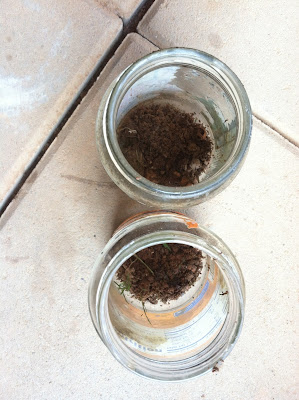You don't need some fancy PH strips to test your soil PH. You can get a rough gauge of your soil's PH by using baking soda and vinegar. This will not accurately tell you exactly where on the scale your soil's PH is but it will give you a rough guide as to whether your soil is acidic, alkaline, or neutral.
Most plants prefer a neutral soil PH in the range of 6.0 to 7.2 which is pretty much neutral. Soil PH ranges from 0 (which is highly acidic) to 14 (highly basic or alkaline) with 7 being considered neutral.
To test your soil, you will want to gather samples from all over your garden (so that you get a general sense of the overall PH of your garden); or, as in my case a sample from a specific point in the garden I want to know the PH level.
You will divide your soil sample into two separate containers each with approximately 2 spoonfuls of soil (if you collected more than that, that's okay - just take two spoonfuls out).
In one container, add approximately 1/2 cup cup of vinegar. If the vinegar fizzes, your soil is alkaline (somewhere between 7 and 14 on the PH scale).
In the other container add about 1/2 cup distilled water (I used rainwater which is naturally distilled) and mix the dirt up so that it is liquid. Next, add 1/2 cup baking soda. If the baking soda fizzes, your soil is acidic (somewhere between 0 and 7 on the PH scale).
Neither of my samples fizzed meaning that my soil should be relatively neutral. As noted above, this is not an exact test so I seriously doubt that my soil was exactly 7 on the PH scale, but it is in the neutral range. This is what I needed to know, now I know why my blueberries are not doing well - they love acidic soil.



No comments:
Post a Comment